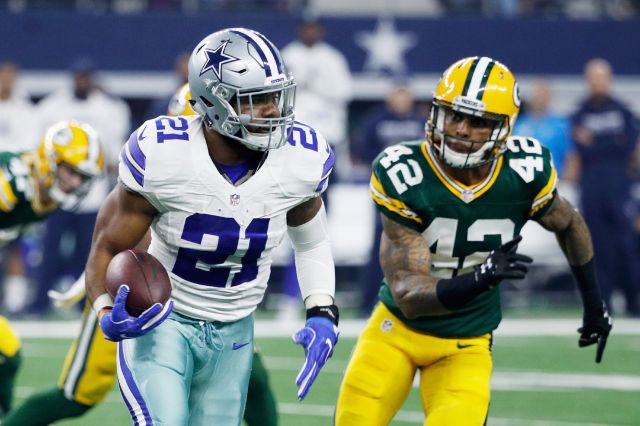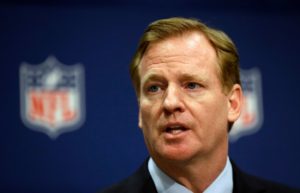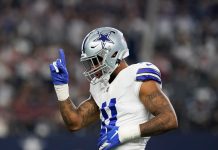
Ezekiel “Zeke” Elliott. One of the biggest surprises of the Cowboy’s 2016/2017 NFL season, Zeke put up insane numbers last year, leading the league in rushing and placing in the top three in overall touchdowns scored. And yet, the question this season isn’t how well he will perform in the 2017 NFL season, but if he should even be playing at all.
The situation began on February 12th of 2016 when Zeke’s ex-girlfriend, Tiffany Thompson first called the police in regard to Zeke allegedly attacking and hurting her. From her account to the police, she claims that because she texted one of his teammates he pushed her, hurting her shoulder. When talking to the Harold Henderson, the NFL arbitrator, she said that Elliott pushed her against the wall, leaving bruises. An examination of the accuser on the day of the alleged event by paramedics showed that she didn’t have any visible signs of injury.
Elliott’s testimony, however, was much different from hers, as he stated in both of his testimonies that he didn’t really shove her hard, just that she was trying to grab onto him as he attempted to lock his door (the police testimony), and that she was trying to block him from unlocking his door (the NFL testimony). Elliott also stated that when she was talking to the police, she was “literally looking at [Elliott],literally…smiling and laughing.”
After this, the next important time frame is July 17th through the 21st when five alleged incidents happened, which taken into perspective was about three months after Elliott was drafted. In a nutshell, the five reported incidents by Thompson were all accusations of violence towards her. Elliott denied that he ever touched her in each of the five incidents.
Witnesses were present during some of the instances or the day after the instances, and each individual witness said that Elliott’s alleged victim never had any bruises the next day or that they hadn’t seen anything happen while Zeke was in the company of the witness and Thompson. The NFL, however, has declared that Elliott was violent in each of the alleged instances, which is the information they used moving on in the trial.
In the evening on July 21st, Thompson threatened Elliott by saying that she was going to call the police. According to Elliott, Thompson said “I’m going to ruin your life” in regard to calling the police on him. Thompson was infuriated that Elliott wouldn’t allow her to come to his birthday celebration, and as a result made these threats. Thompson stated that Elliott didn’t want to be around her during this time frame because he didn’t want to hurt her. Both Elliott and the accuser agreed that he never laid a hand on her that whole day.
A day later, on his birthday, Thompson stated that Elliott had dragged her out of his car, leaving her wrist bruised and red. Police took pictures of the injuries that took place that day. Elliott, however, denied that he assaulted her, and claimed that she got her bruises in a bar fights. Four witnesses saw the altercation in the parking lot, and that Elliott hadn’t touched the accuser. To add to this, records show that Thompson sent a text to one of her friends, which said to tell the police that Elliott had pulled her out his car. Her friend responded, asking if she wanted her to lie, to which Thompson responded “Yea.”
Later that night, this same friend, a few witnesses, and two off-duty police officers saw a fight between Thompson and another woman. The officers saw punches being thrown, but the other witnesses claimed only hair pulling and slapping occurred. After this, Thompson left to meet up with Elliott and some others for his birthday celebration. According to several witnesses, after seeing Elliott drive up with one of his other female friends as his designated driver, Thompson stated once again that she would “ruin his career.” When the court reached this part of the trial, the NFL declared that Thompson lied to the police and the NFL officially started their review of the case.

Moving forward to August 11th, Elliott was given his six-game suspension, which was solely the decision of Roger Goodell, because of his power as NFL commissioner. Elliott and his legal team immediately decided to appeal, which was formally filed on August 15th.
On the 29th of August, Elliott’s appeal was held in New York, in front of Harold Henderson, an NFL arbitrator. The hearing ended on the 31st of August. Then, on September 5th, the suspension was upheld by the NFL, but Elliott was allowed to play in week one.
After this, Elliott was granted an injunction on September 8th, which would have blocked the suspension for most likely the whole season. The NFL filed an appeal to this injunction, but the appeal process will take a long time and outcome is unclear. From this point, many other trials and appeals have taken place, leading to a long legal battle. It appears as of now that he will be serving the suspension, which will obviously be a hard blow to the Cowboys as they seek a playoff spot.
The attention brought to the subject of domestic violence and attention towards the NFL, the Cowboys organization, and Zeke, raises many questions for our reflection.
The obvious question the trial brings up is the subject of our relationships with women, which even reflects back to our recent Ignatian Day over the same topic. As shown in the I-Day, often times women are treated differently solely because of their gender, and the trial raises questions of “How do I treat women or someone I’m in a relationship with.” These are underlying issues in society that are often mentioned, but rarely broached and spoken about in detail.
But what if he’s proven innocent? Even so, the question remains: “Does our behavior give others the impression that we may be engaged in immoral acts?” He may be completely innocent this time, but if in the past he had done something with a women where he wasn’t innocent and someone observed this, maybe they believe he’s guilty this time despite not having first-hand evidence, simply because of his past. This example really reflects how nearly everything we do is remembered whether it be a person’s memory or technologically recorded, and it emphasizes how this memory can create or escalate a potentially false situation.
The publicized trial also emphasizes just how public our lives are. Even if we are not “famous” our lives are an open book due to social media, yet people still do things they shouldn’t be doing and then post it for people to see. It’s almost like we know that we are being watched on social media, but we just don’t the realize the degree to which we are being observed.
In the case of Elliott, the press stalks him but is our social media activity a version of “stalking” we intentionally set up? While there isn’t a definitive answer to this, the whole case raises many moral dilemmas and social issues which may not have been as obvious before the trial
Stay tuned to the Roundup for more Cowboys and other news!
Sources





